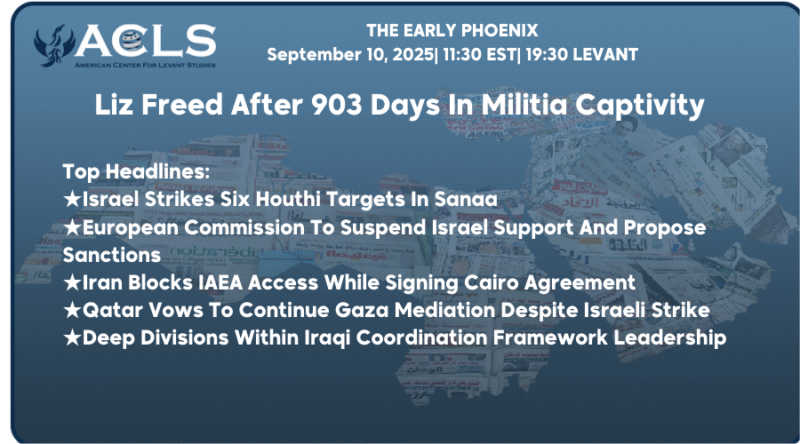
★ISRAEL
-
Liz Freed After 903 Days In Militia Captivity
Israeli-Russian scholar Elizabeth Tsurkov has been freed in Baghdad after more than two years in captivity by Iran-aligned Kataib Hezbollah. Iraqi security services reportedly located her detention site and handed her to U.S. custody. Israel says she will return within days for post-captivity care similar to Gaza hostages. Circumstances and any concessions remain unclear, though officials credit coordinated efforts by Iraqi authorities, U.S. intermediaries, and advocates. Kataib Hezbollah has not disclosed terms. Tsurkov, kidnapped in March 2023 while researching in Baghdad, had been accused of espionage in coerced videos; her release ends a 900+ day ordeal and signals Baghdad’s bid to assert authority over Iran-backed militias.
-
Israel Strikes Six Houthi Targets In Sanaa
Israeli airstrikes reportedly hit six Houthi targets in Sanaa on Wednesday, with loud explosions reported and a defense facility in the al-U’rdi neighborhood named among the sites, according to regional and Houthi-linked media.
-
European Commission Moves To Suspend Israel Support, Propose Sanctions
EU Commission President Ursula von der Leyen announced plans to partially suspend EU-Israel partnership agreements and propose sanctions on Israel’s extremist ministers, targeting trade matters while preserving support for Israeli civil society and Yad Vashem. The Commission will also create a donor group for Palestinians, including Gaza reconstruction, condemning the man-made famine as a war weapon.
-
Hamas Says Delegation Survived Israeli Strike In Qatar, Five Killed
Hamas said an Israeli strike in Doha failed to kill its negotiating delegation but killed five others, including Homam Haya, son of leader Khalil Haya. The group condemned the attack as a violation of Qatar’s sovereignty and accused Israel, with U.S. support, of undermining peace efforts. Hamas vowed to continue seeking a ceasefire, prisoner exchange, and aid for Gaza.
-
Hamas Claims Responsibility For Jerusalem Shooting That Killed Six
Hamas claimed responsibility for Monday’s shooting in northern Jerusalem that killed six Israeli civilians. The attack prompted Israeli airstrikes on Hamas leadership in Doha and expanded IDF operations in Judea and Samaria, including the demolition of terrorists’ homes. Israeli authorities cited these measures as deterrence against ongoing Hamas attacks, which have targeted thousands in the region over the past year.
============
★IRAN
-
Iran Blocks IAEA Access While Signing Cairo Agreement
Iran signed an agreement with the IAEA in Cairo on September 9, 2025, establishing a framework for resuming nuclear inspections but still denying inspectors access to most sites. Effectively, Iran refused immediate inspection access despite the formal deal, making the agreement conditional and tentative. Iran’s Foreign Minister Abbas Araghchi said the deal must respect Iran’s security concerns and follow domestic law, with inspector access to be negotiated later; only Bushehr plant inspections continue.
============
★THE GULF
-
Qatar Vows to Continue Gaza Mediation Despite Israeli Strike
Qatari Prime Minister Sheikh Mohammed bin Abdulrahman al-Thani said Qatar’s mediation role in Gaza is part of its identity and will not be deterred by Israel’s strike on Hamas leaders in Doha. Al-Thani condemned the attack as “100% treacherous,” criticized Netanyahu for “state terrorism,” and said Qatar may respond legally and diplomatically while continuing efforts to halt the war.
-
Arab States Condemn Israeli Strike On Hamas In Doha
Arab countries and regional groups strongly condemned Israel’s airstrike on Hamas leaders in Doha, calling it a violation of Qatar’s sovereignty and international law. Iran, the UAE, Palestine, Kuwait, Jordan, Iraq, Saudi Arabia, Yemen, and Turkey all denounced the attack, while the UN Secretary-General urged all parties to work toward a lasting Gaza ceasefire.
==================
★ IRAQ
-
Divisions Deepen Within Iraqi Coordination Framework Leadership
Rahman al-Jazaeri confirmed deep rifts within Iraq’s Iran-backed Coordination Framework, driven by disputes over militia disarmament, control of the Popular Mobilization Forces, and U.S. pressure. He highlighted the unresolved clash between Nouri al-Maliki and Prime Minister Mohammed Shia al-Sudani, warning post-election exposures could target Shi’a and Sunni parties through international courts.
=========
★EGYPT
-
Israel–Egypt Gas Deal Sparks Political Tensions
Israel’s $35 billion Leviathan gas export deal with Egypt, supplying gas through 2040, has sparked a political dispute as Netanyahu questioned the contract over alleged Egyptian treaty violations. Despite rhetoric, experts stress Egypt’s reliance on Israeli gas amid domestic shortages and regional export ambitions. Analysts warn that politicizing energy threatens trust, regional stability, and ongoing humanitarian efforts in Gaza.
=========
★ Disclaimer: The Early Phoenix is a digest of various news sources compiled by the Early Phoenix team and edited by Rania Kisar. The items are curated, concise summaries of news items hyperlinked within each story. The items and summaries presented do not necessarily represent the views of the American Center for Levant Studies.



